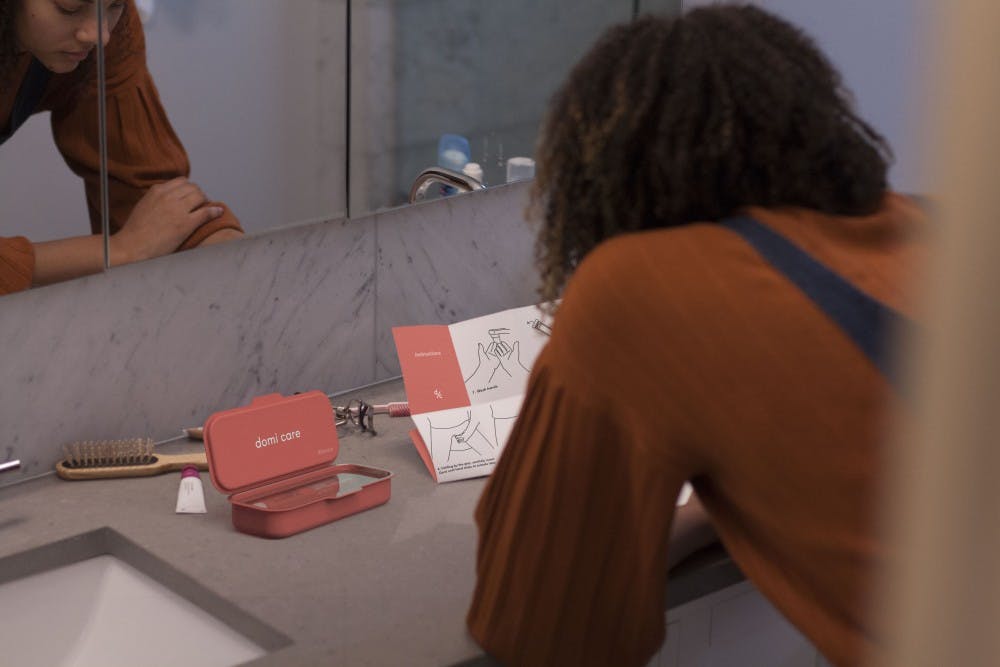In a time of deep polarization on the subject of women’s reproductive health and rights, an ASU student and an ASU alumna have created Domi Care, a self-administered Pap smear test to make a difference in the future of women's reproductive healthcare.
Industrial design senior Anastasia Miller and ASU industrial design alumna Lauren Emmerson, who created the test, said it's designed to work like a tampon. It is inserted inside the user and retrieves cell samples, which are then sent to a laboratory to check for abnormalities.The test can screen for HPV, chlamydia and gonorrhea.
Domi Care also comes along with an app, with which the user can track the progress of the test. Emmerson said she wanted to make the process of receiving results for a Pap smear test less of a stressful experience.
According to ASU Health Services, Pap smears and STI testing are offered on campus. With insurance, a Pap smear performed at an ASU clinic may not cost anything, but Miller and Emmerson said uninsured pap smears cost around $300, whereas Domi Care costs $79.
The industrial designers began working on the project in January 2017, during the time of the inaugural Women’s March. Miller said that it was a very “tumultuous” time for women’s rights and they wanted to do what they could to have an “active role” in that conversation.
“(Looking at) how polarizing our political situation in this country has become and how ‘hanging by a thread’ healthcare has become for everybody, it’s terrifying and you hope that you’re able to take the tests you need," Emmerson said.
While designing the test, Emmerson and Miller looked specifically at the millennial audience.
“That’s an age range where a lot of women are either changing their health insurance, they might be moving, they might not have a primary care physician,” Miller said.
She stressed that a lot of recent high school graduates who may be exploring their sexuality with multiple partners could find Domi Care useful for STI testing.
Miller said that Pap smears are usually a very uncomfortable procedure, especially for those receiving it for the first time.
“It’s very anxiety inducing, and that causes the cervix to tighten so they don’t get a proper cell sample or it makes the test more painful," she said. “In some cases you do it before class and you’re like, ‘Wow I feel disgusting, I want to take a shower,’ and no one prepares you for that."
The test is also faster and more convenient than seeing a doctor, which "can take up to 30 days," Emmerson said.
Denise Link, Ph.D., a women’s health nurse practitioner and clinical professor of nursing at the ASU College of Nursing and Health Innovation, said that self-administered tests are important especially for hard to reach populations of women such as LGBTQ+ women, those who live in rural or conflict areas, and those who are uninsured.
But Link said that the best option is to provide self-administered tests within doctors offices.
“Seeing the patient (in person) offers an opportunity to screen them for skin cancer, colon cancer, making sure that women are getting their immunizations, that they’re getting their HPV vaccine, screening for family planning,” Link said.
Emmerson and Miller said they hope to have Domi Care distributed through college campuses and in doctor’s offices once it receives FDA approval. They recently won first place in the International Housewares Competition and received a prize of $2,500 and a trip to Chicago for the International Home and Housewares Show.
Link said that she thinks this test can certainly be a part of a comprehensive package of healthcare and can be a starting point for women who are ignorant about their reproductive health because performing the test encourages them to research their anatomy.
Reach the reporter at ajmistry@asu.edu or follow @jay_mistry52 on Twitter.
Like The State Press on Facebook and follow @statepress on Twitter.




